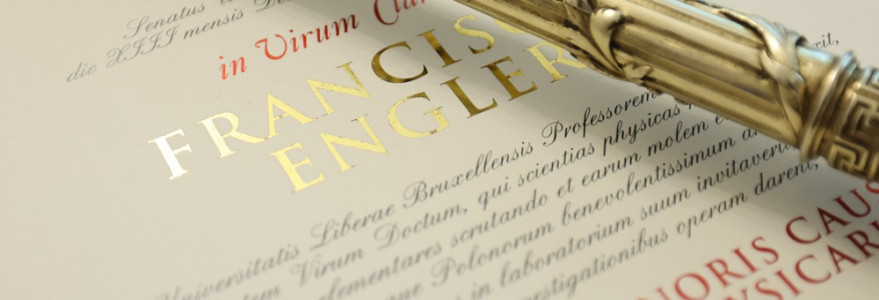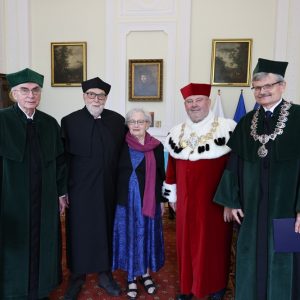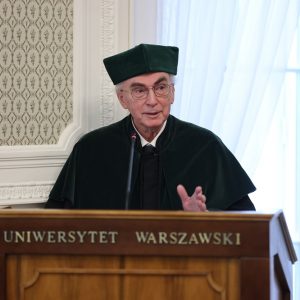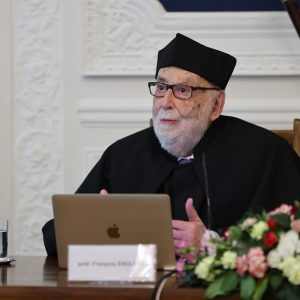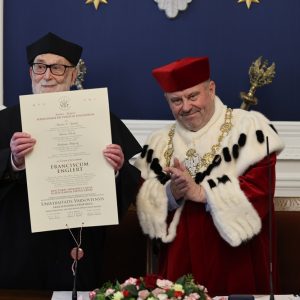The University of Warsaw bestowed Doctor Honoris Causa upon an outstanding theoretical physicist and Nobel Prize laureate – Prof. François Englert. The conferral ceremony was held on 23rd April in the Senate Hall of the Kazimierzowski Palace.
Prof. François Englert is a Belgian physicist with Polish roots – his parents emigrated from Poland in 1924. He received degrees in electromechanical engineering and physics from the Université Libre de Bruxelle (Free University of Brussels; ULB), before obtaining a doctorate in physics from the ULB in 1959. In the major part of his professional career he has been affiliated with the ULB.
“I am being proud to welcome Professor Englert in our academic community. Having devoted so many hours to teaching and doing research at the Faculty of Physics of the University of Warsaw, you have made an enormous contribution to the collaboration between our Universities as well as development in the field of theoretical physics,” Prof. Alojzy Z. Nowak, the UW Rector, began the ceremony of conferring the Doctor Honoris Causa title to Prof. François Englert on 23rd April in the Kazimierzowski Palace on the UW Campus at Krakowskie Przedmieście.
In 1964, Prof. François Englert and Prof. Robert Brout wrote a ground-breaking paper “Broken Symmetry and the Mass of Gauge Vector Mesons”. In 2013, together with Prof. Brout, he was awarded The Nobel Prize for the theoretical discovery of a mechanism that contributes to our understanding of the origin of mass of subatomic particles, and which recently was confirmed through the discovery of the predicted fundamental particle, by the ATLAS and CMS experiments at the CERN’s Large Hadron Collider. In July 2012, with Prof. Englert and Prof. Higgs in attendance, the CERN scientists, detected an interesting signal probably from a Higgs boson with a mass of 125-126 giga-electron volts, thus confirming the existence of the Higgs particle. The discovery of the BEH particle is one of the major scientific achievements of the twenty-first century. On discovering the BEH mechanism, Prof. François Englert focused his research work on the basic theoretical problem of solving the apparent conflict between Einstein’s classical theory of gravity and the quantum description of other interactions.
An example to follow
The achievements of the honourable scientist as well as his relations with the University of Warsaw were presented by Prof. Stefan Pokorski from the UW Institute of Theoretical Physics, “Professor François Englert joins the narrow group of outstanding physicists and Nobel Prize winners who have been awarded honorary doctorates of our University – Louis de Broglie, Frederic Joliot-Curie, Cecil Frank Powell, Niels Bohr, Roger Penrose, and Shuji Nakamura. Professor Englert had a great impact on the development of theoretical physics at the University of Warsaw. He played a very important role in the formation of the Warsaw school of the theory of elementary interactions and had a strong influence on the choice of research directions of a group of young theoreticians at the Institute of Theoretical Physics.”
“It is my great honour and pleasure to represent the Faculty of Physics of the University of Warsaw during this ceremony. I would like to emphasise how strong ties connect Professor Englert with the University of Warsaw. His quality of worth and excellence has marked the tremendous influence on our Faculty and the Warsaw school of elementary particle physics,” said Prof. Dariusz Wasik, the Dean of the UW Faculty of Physics.
Passion for the quest
In his speech Prof. François Englert presented the pathway of a scientist while exerting an emphasis on his tragic childhood in Belgium, occupied by the Nazis then.
“The university studies aroused my interest in physics. This choice of my scientific career has brought the satisfaction from scientific investigation and collaboration. The quest passion for science helped me to overcome my overwhelming memories,” Prof. François Englert said.
The collaboration between Prof. François Englert and the scientists from the University of Warsaw largely contributed to the development of innovative research work at the Faculty of Physics and education of young physicists. More than twenty doctoral theses investigated the Brout-Englert-Higgs mechanism in the Standard Model.
Prof. Englert has been recognised with numerous honours for his scientific achievements, including the 1982 Francqui Prize, the 1997 High Energy and Particle Physics Prize, the 2004 Wolf Prize in Physics, the 2010 J.J. Sakurai Prize for Theoretical Particle Physics by The American Physical Society, and the 2013 Prince of Asturias Award for Technical and Scientific Research.



